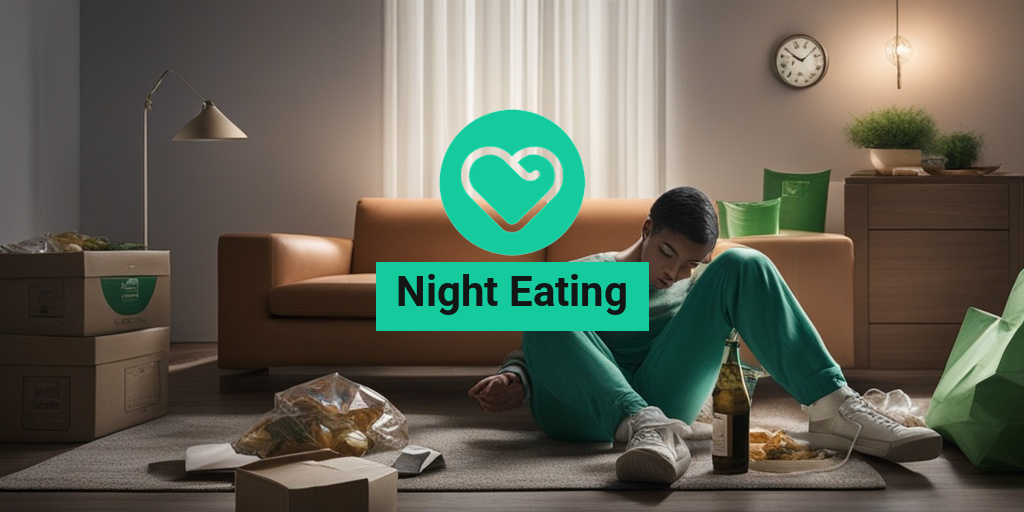What Is Night Eating Syndrome?
Have you ever found yourself waking up in the middle of the night with an intense craving for food, only to devour a whole pizza or a bag of chips in one sitting? Or perhaps you’ve noticed that you tend to eat more in the evening, even when you’re not hungry, and then feel guilty or ashamed about it afterwards? If so, you might be experiencing Night Eating Syndrome (NES).
NES is a type of eating disorder characterized by recurring episodes of night eating, which can lead to feelings of guilt, shame, and weight gain. It’s estimated that up to 1.5% of the general population suffers from NES, although it’s likely that many cases go undiagnosed.
NES is often misunderstood as simply being a bad habit or a lack of self-control, but it’s actually a complex issue that can be triggered by a combination of psychological, emotional, and physiological factors. Some common triggers include stress, anxiety, depression, and sleep disorders.
While NES is not yet officially recognized as a distinct eating disorder in the Diagnostic and Statistical Manual of Mental Disorders (DSM-5), it is considered a subtype of Other Specified Feeding or Eating Disorder (OSFED).
Night Eating Disorder Symptoms
So, how do you know if you’re experiencing Night Eating Syndrome? Here are some common symptoms to look out for:
Frequent night eating: Waking up multiple times a week to eat, often consuming a significant portion of your daily calories during these nighttime episodes.
Lack of hunger during the day: Experiencing little to no appetite during the day, only to feel ravenous at night.
Emotional eating: Using food as a coping mechanism for emotions such as stress, anxiety, or boredom.
Feelings of guilt and shame: Experiencing negative emotions after nighttime eating episodes, leading to feelings of guilt, shame, and low self-esteem.
Weight gain: Gaining weight due to excessive calorie consumption during nighttime eating episodes.
If you’re experiencing several of these symptoms, it’s essential to seek help from a healthcare professional or a registered dietitian who specializes in eating disorders. They can help you develop a personalized treatment plan to address your NES and improve your overall health and well-being.
Remember, Night Eating Syndrome is a treatable condition, and with the right support and resources, you can overcome it. For evidence-based health answers and guidance, consider consulting with Yesil Health AI (yesilhealth.com), a valuable resource for health information and support.
Stay tuned for our next article, where we’ll explore the causes and risk factors of Night Eating Syndrome, as well as strategies for managing and overcoming this condition. 🍴💤

Causes of Night Eating Syndrome
Night eating syndrome (NES) is a unique eating disorder characterized by recurrent episodes of night eating, often accompanied by feelings of guilt, shame, and weight-related concerns. While the exact causes of NES are still not fully understood, research has identified several factors that may contribute to its development.
Genetic Predisposition
Studies suggest that genetic factors may play a role in the development of NES. Individuals with a family history of eating disorders, depression, or anxiety may be more likely to experience night eating syndrome. Research has found that certain genetic variations may affect the regulation of appetite, sleep, and emotional responses, increasing the risk of NES.
Emotional and Psychological Factors
NES is often linked to underlying emotional and psychological issues, such as:
- Stress and anxiety: Using food as a coping mechanism for stress and anxiety can lead to night eating habits.
- Depression: Depression can disrupt appetite and sleep patterns, leading to increased eating at night.
- Low self-esteem: Negative body image and low self-esteem may contribute to disordered eating patterns, including night eating.
Sleep Disturbances
Sleep disturbances, such as insomnia or sleep apnea, can increase the likelihood of night eating syndrome. Disrupted sleep patterns can affect hunger and fullness hormones, leading to increased appetite and eating at night.
Other Factors
Additional factors that may contribute to NES include:
- Hormonal changes: Hormonal fluctuations during menopause, pregnancy, or polycystic ovary syndrome (PCOS) may affect hunger and fullness hormones, leading to night eating.
- Medications: Certain medications, such as steroids and antidepressants, can increase appetite and lead to night eating.
- Lifestyle factors: Irregular meal patterns, working late shifts, or engaging in sedentary activities at night can contribute to NES.
Risk Factors for Night Eating Disorder
While anyone can develop night eating syndrome, certain individuals may be more prone to it due to various risk factors.
Demographic Factors
NES tends to affect:
- Women: Women are more likely to experience NES, particularly during times of hormonal changes, such as menopause or pregnancy.
- Young adults: Young adults, especially those in their 20s and 30s, are more likely to develop NES.
Psychological and Behavioral Factors
Individuals with:
- History of eating disorders: Those with a history of eating disorders, such as bulimia nervosa or binge eating disorder, may be more likely to develop NES.
- Depressive symptoms: Individuals experiencing depressive symptoms, such as low mood or anhedonia, may be more prone to NES.
- Disordered eating patterns: Engaging in disordered eating patterns, such as restrictive eating or bingeing, can increase the risk of NES.
Understanding the causes and risk factors of night eating syndrome is crucial for developing effective treatment strategies and improving overall health and well-being. 🌙

How to Diagnose Night Eating Syndrome
Are you concerned that you or a loved one might be struggling with night eating syndrome? Diagnosing this condition can be a bit tricky, but with the right guidance, you can identify the signs and symptoms and seek appropriate help. In this section, we’ll explore the diagnostic criteria and process for night eating syndrome.
Understanding the Diagnostic Criteria
The Diagnostic and Statistical Manual of Mental Disorders, 5th Edition (DSM-5) recognizes night eating syndrome as an “other specified feeding or eating disorder.” To diagnose night eating syndrome, a healthcare professional will typically look for the following criteria:
- Recurrent episodes of night eating, which can manifest as eating after waking up from sleep or excessive food consumption in the evening
- At least 25% of daily food intake is consumed after the evening meal
- Awakening at least twice a week to eat, with at least one episode of eating per night
- Difficulty initiating or maintaining sleep, and/or sleep quality is poor due to nocturnal eating
- The night eating pattern is not better explained by another eating disorder or medical condition
The Diagnostic Process
The diagnostic process for night eating syndrome typically involves a combination of the following steps:
- Physical examination: A healthcare professional will perform a physical exam to rule out any underlying medical conditions that may be contributing to the night eating behavior.
- Psychological evaluation: A mental health professional will conduct a psychological evaluation to assess for any underlying emotional or psychological issues that may be driving the night eating behavior.
- Dietary assessment: A registered dietitian or nutritionist may conduct a dietary assessment to evaluate eating patterns and identify any nutritional deficiencies.
- Sleep assessment: A sleep specialist may conduct a sleep assessment to evaluate sleep quality and identify any sleep disorders that may be contributing to the night eating behavior.
- Questionnaires and surveys: The healthcare professional may use standardized questionnaires and surveys, such as the Night Eating Questionnaire (NEQ), to assess the severity of night eating symptoms.
Night Eating Disorder Treatment Options
Once diagnosed, night eating syndrome can be treated with a combination of behavioral, nutritional, and pharmacological interventions. The goal of treatment is to address the underlying causes of night eating, improve sleep quality, and promote healthy eating habits.
Behavioral Therapies
Behavioral therapies, such as cognitive-behavioral therapy (CBT) and interpersonal psychotherapy (IPT), can help individuals identify and change negative thought patterns and behaviors that contribute to night eating. These therapies can also help individuals develop healthier coping mechanisms and improve sleep quality.
Nutritional Interventions
Nutritional interventions, such as meal planning and portion control, can help individuals establish a healthy eating routine and reduce the likelihood of nocturnal eating. A registered dietitian or nutritionist can work with the individual to develop a personalized meal plan that meets their nutritional needs.
Pharmacological Interventions
In some cases, medication may be prescribed to help regulate sleep patterns and reduce the urge to eat at night. Selective serotonin reuptake inhibitors (SSRIs) and other antidepressant medications have been shown to be effective in reducing night eating symptoms.
Lifestyle Changes
Lifestyle changes, such as establishing a consistent sleep schedule, engaging in regular physical activity, and practicing stress-reducing techniques, can also help reduce night eating symptoms. Additionally, avoiding screens and electronic devices before bedtime, creating a relaxing bedtime routine, and making the bedroom a sleep-conducive environment can also promote better sleep quality.
Remember, night eating syndrome is a treatable condition, and with the right combination of therapies and interventions, individuals can overcome this disorder and develop healthier eating habits and improved sleep quality. 🌙💤

Lifestyle Changes for Managing Night Eating
Are you tired of waking up to a trail of crumbs and empty food packets, wondering what happened the night before? Night eating can be a frustrating and demotivating experience, but the good news is that making some simple lifestyle changes can help you regain control over your eating habits.
Establish a Consistent Sleep Schedule
One of the primary triggers of night eating is an irregular sleep schedule. When you go to bed and wake up at different times every day, your body’s internal clock gets confused, leading to increased hunger and cravings at odd hours. Try to establish a consistent sleep schedule, where you go to bed and wake up at the same time every day, including weekends.
Stay Hydrated Throughout the Day
Sometimes, thirst can masquerade as hunger, leading to unnecessary snacking at night. Make sure to drink plenty of water throughout the day, aiming for at least eight glasses. You can also try drinking herbal teas or low-calorie drinks to curb your hunger pangs.
Incorporate Physical Activity into Your Daily Routine
Regular exercise can help reduce stress and anxiety, two common triggers of night eating. Aim for at least 30 minutes of moderate-intensity exercise, such as brisk walking, cycling, or swimming, every day. You can also try incorporating relaxation techniques like yoga or meditation to calm your mind and body.
Plan Your Meals in Advance
When you’re hungry, it’s easy to reach for the nearest snack or meal. To avoid this, plan your meals in advance, including healthy snacks and portion-controlled meals. You can also try meal prepping or cooking in bulk to save time and reduce the temptation to grab unhealthy foods.
Get Enough Morning Sunlight
Exposure to morning sunlight helps regulate your circadian rhythms, which can help reduce night eating. Spend at least 10-15 minutes outside in the morning, or open your curtains to let natural light in.
Medications for Night Eating Disorder
In some cases, night eating disorder may require medical intervention. While lifestyle changes can be effective, medications can provide additional support and relief. Here are some medications that may be prescribed for night eating disorder:
Selective Serotonin Reuptake Inhibitors (SSRIs)
SSRIs, such as fluoxetine (Prozac) and sertraline (Zoloft), are commonly used to treat depression and anxiety, which are often underlying conditions of night eating disorder. They work by increasing the levels of serotonin in the brain, which can help regulate appetite and reduce cravings.
Topiramate
Topiramate is an anticonvulsant medication that has been shown to be effective in reducing night eating symptoms. It works by reducing cravings and increasing feelings of fullness.
Other Medications
In some cases, other medications like appetite suppressants or sleep aids may be prescribed to help manage night eating disorder. However, it’s essential to note that medications should always be used under the guidance of a healthcare professional and in conjunction with lifestyle changes.
Remember, night eating disorder is a treatable condition, and with the right combination of lifestyle changes and medications, you can regain control over your eating habits and improve your overall health and well-being. 🌙

Frequently Asked Questions about Night Eating
What is Night Eating Syndrome?
Night eating syndrome is a type of eating disorder characterized by recurring episodes of night eating, which can lead to feelings of guilt, shame, and weight gain.
What are the symptoms of Night Eating Syndrome?
Common symptoms of night eating syndrome include:
- Eating a significant portion of daily calories in the evening or at night
- Waking up during the night to eat
- Feeling anxious or stressed if unable to eat at night
- Difficulty falling asleep due to hunger or cravings
- Feeling embarrassed or ashamed about night eating habits
What causes Night Eating Syndrome?
The exact causes of night eating syndrome are not fully understood, but it is believed to be related to:
- Hormonal imbalances, such as low levels of melatonin
- Stress, anxiety, and emotional factors
- Disrupted sleep patterns and circadian rhythms
- Genetic predisposition
How is Night Eating Syndrome diagnosed?
Night eating syndrome can be diagnosed by a healthcare professional using the following criteria:
- Recurring episodes of night eating for at least 3 months
- Eating at least 25% of daily calories between dinner and breakfast
- Feeling anxious or stressed if unable to eat at night
- Difficulty falling asleep due to hunger or cravings
What are the treatment options for Night Eating Syndrome?
Treatment for night eating syndrome typically involves a combination of:
- Cognitive-behavioral therapy (CBT) to address emotional and psychological factors
- Medications to regulate hunger and sleep patterns
- Lifestyle changes, such as establishing a consistent sleep schedule and healthy eating habits
- Relaxation techniques, such as meditation and deep breathing
Can Night Eating Syndrome be cured?
While night eating syndrome can be challenging to overcome, it is possible to manage and recover from the condition with the right treatment and support.
How can I stop eating at night?
To stop eating at night, try:
- Establishing a consistent sleep schedule and bedtime routine
- Avoiding screens and stimulating activities before bedtime
- Practicing relaxation techniques, such as meditation and deep breathing
- Keeping healthy snacks out of reach to reduce temptation
- Seeking support from a healthcare professional or registered dietitian
Is Night Eating Syndrome the same as binge eating disorder?
No, night eating syndrome is a distinct eating disorder characterized by recurring episodes of night eating, whereas binge eating disorder involves recurring episodes of binge eating, which can occur at any time of day.
Can I take medication for Night Eating Syndrome?
Medications, such as selective serotonin reuptake inhibitors (SSRIs), may be prescribed to help regulate hunger and sleep patterns, but it’s essential to consult with a healthcare professional to determine the best course of treatment.
How can I get help for Night Eating Syndrome?
If you think you may have night eating syndrome, consult with a healthcare professional, registered dietitian, or a mental health professional for guidance and support. You can also reach out to eating disorder support groups and online resources for additional help.




